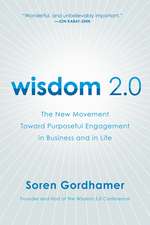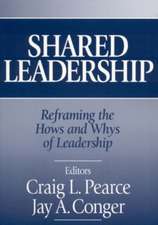The Handbook of Cross-Cultural Management Research
Autor Peter B. Smith, Mark F. Peterson, David C. Thomasen Limba Engleză Hardback – 28 iul 2008
Preț: 1091.87 lei
Preț vechi: 1495.71 lei
-27% Nou
Puncte Express: 1638
Preț estimativ în valută:
208.92€ • 218.15$ • 172.52£
208.92€ • 218.15$ • 172.52£
Carte tipărită la comandă
Livrare economică 15-29 aprilie
Preluare comenzi: 021 569.72.76
Specificații
ISBN-13: 9781412940269
ISBN-10: 1412940265
Pagini: 592
Dimensiuni: 178 x 254 x 35 mm
Greutate: 1.22 kg
Ediția:1
Editura: SAGE Publications
Colecția Sage Publications, Inc
Locul publicării:Thousand Oaks, United States
ISBN-10: 1412940265
Pagini: 592
Dimensiuni: 178 x 254 x 35 mm
Greutate: 1.22 kg
Ediția:1
Editura: SAGE Publications
Colecția Sage Publications, Inc
Locul publicării:Thousand Oaks, United States
Cuprins
Chapter 1: Introduction - Mark F. Peterson, Peter B. Smith, and David C. Thomas
The Essence of Culture: Systems of Values, Beliefs and Meanings
Links between People and Organizations
Organizational Structures and Processes
Managing a Multiple Nation Workforce
Chapter 2: Cognitive Structures and Processes in Cross-Cultural Management - Mark F. Peterson and Robert E. Wood
Motives and Motivation Processes
Personality Constructs
Cognitive Perspectives for Cross-Cultural Management Research
Conclusions From Cognitive Theory
Research Agenda
Chapter 3: Social Structures and Processes in Cross-Cultural Management - Mark F. Peterson and Peter B. Smith
Nations as Cultures
How is Culture Created, Maintained, and Disseminated?
Where Should Cultural Boundaries Be Drawn?
Individuals Within Social Structures: Roles, Rules, and Norms
Chapter 4: Methods and Measurementsin Cross-Cultural Management - Kwok Leung
Methodological Challenges in Cross-Cultural Management Research
Cross-Cultural Equivalence
Design of Cross-Cultural Studies
Establishing Causality in Cross-Cultural Management Research
Methodological Issues in International Management Research
Emerging Methodological Issues in Cross-Cultural Management Research
Chapter 5. Motivation and Job Satisfaction across Nations: How Much Do We Really Know? - Xu Huang
The Theoretical Challenge to Universal Motivation Theories
Empirical Evidence of Cross-National Variability
In Defense of Universalist Motivation Theories
How Much Do We Really Know?
Chapter 6: Organizational Commitment: Complication or Clarification - S. Arzu Wasti
Dimensions of Organizational Commitment
Antecedents of Organizational Commitment
Outcomes of Organizational Commitment
Chapter 7. Psychological Contracts around the Globe: Cultural Agreements and Disagreements - Rene Schalk and Joseph Soeters
Introduction
Characteristics of Psychological Contracts
The World as One Culture and as Many
Aspects of Cross-Cultural Differences in Psychological Contracts
Conclusions and Suggestions for Future Research
Chapter 8. Organizational Justice and Reward Allocation - Ronald Fischer
Dimensions of Justice
Distributive Justice
Interpersonal Justice
Justice Perceptions
Areas for Future Development
Chapter 9. International Careers - Kerr Inkson and Svetlana Khapova
Introduction
The Special Nature of Careers in International Contexts
Contextual Influences on International Careers
Migration and International Careers
Two Types of International Career
Current Issues in International Careers
Chapter 10. Organizational Citizenship in the Global Context - Larry Jiing-Lih Farh, Rick Hackett, and Zhi-Jun Chen
National Culture
Criteria for Selecting Studies for Review
Review of the Literature
The Influence of National Culture on the Construct Domain of Organizational Citizenship Behaviour
The Influence of National Culture on Differences in Organizational Citizenship Behaviour
Moderating Effects of National Culture on Predictor- Organizational Citizenship Behaviour Relationships
Moderating Effects of National Culture on Organizational Citizenship Behaviour -Outcome Relationships
Future Research Direction
Chapter 11. Work and Family: Research in Cross-National and International Contexts - Mila Lazarova and Michelle Lowe
Expatriate Work/Family Research
Research across Different National Contexts
Comparative Work/Family Research
Conclusions and Directions for Future Research
Chapter 12. Cross Cultural Skills and Abilities: From Communication Competence to Cultural Intelligence - David C. Thomas and Stacey R. Fitzsimmons
Effective Intercultural Interactions
The Historical Basis for Studying Cross-Cultural Skills and Abilities
Models of Intercultural Effectiveness
A Typology of Cross-Cultural Skills and Abilities
Conclusion
Chapter 13. Cross-Cultural Approaches to Leadership - Zeynep Aycan
Theoretical Approaches to Leadership in Cultural Context
A Critical Review of Cross-Cultural Leadership Research
Culture as a Main Effect Influencing Leadership
Culture as a Moderator of the Relationship between Leadership and Outcomes
Culture as a Source of Meaning: The Case of Paternalistic Leadership
Chapter 14. Cross-Cultural Influence Strategies and Power Sources - Ping Fing Fu and Jun Liu
Introduction
The Existing Literature: A General Review
A New Approach
Conclusion
Chapter 15. Teams Within and Across Cultures - Nir Halevy and Lilach Sagiv
Multicultural Teams
The Cultural Group Approach
The Dynamic Constructivist Approach
Unresolved Issues and Opportunities for Research
Chapter 16. Culture and Negotiation - Jeanne Brett adn Susan Crotty
The Dimensional Approach to Studying Cultural Effects on Negotiations
The Cultural Group Approach
The Dynamic Constructivist Approach
Unresolved Issues and Opportunities for Research
Chapter 17. The Culture of Global Organizations - Miriam Erez and Efrat Shokef
The Nature of Multinational Enterprises
Culture as a Multi-Level Dynamic Construct
A Global Work Culture
An Empirical Examination of the Global Work Culture Value Typology
Summary and Discussion
Chapter 18. Knowledge Management and Knowledge Transfer in Multinational Enterprises: Cultural and Institutional Perspectives - Jon Lervik
Introduction
Cross-Cultural Perspectives
Neo-Institutionalism
Discussion and Conclusion
Chapter 19. Indigenous Aspects of Management - Peter B. Smith
Societal Systems of Capitalism
More Specific System Elements
Emic Approaches
Strengthening the Contribution from Indigenous Studies
Chapter 20. Climate, Wealth, and Organization - Evert van de Vliert
Climate and National Culture in Organizations
Climate-Wealth Foundation of Organization Construction
Climato-Economic Niches of Organizational Structures
Climato-Economic Niches of Organizational Strategies
Three Tentative Conclusions
Three Remaining Puzzles
Chapter 21. Comparative Human Resource Management Policies and Practices - Chris Brewster and Wolfgang Mayrhofer
Comparing HRM around the Globe
Explaining the Differences in Comparative HRM: Culture and Institutions
Evidence of Convergence?
Conclusions
Chapter 22. Expatriate Selection and Evaluation - Rosalie Tung and Arup Varma
Introduction
Expatriate Selection
Expatriate Evaluation
Discussion
Chapter 23. Global Diversity Management - Mustafa Özbilgin
Introduction
Historical Development of the Diversity Management Concept
Single-Nation Diversity Management Research
Global Diversity Management: From Practice to Theory
Discussion
Chapter 24. Cross-Cultural Training: Applications and Research - Richard Brislin, Brent Macnab, and Farzana Nayani
Goals of Cross-Cultural Training
The Need for Cross-Cultural Training
Historical Development of Cross-Cultural Training
Development of Cross-Cultural Training Methods
Types of CCT Programs
CCT Effectiveness
Recommendations for Future CCT Research
Final Thoughts, Practical Recommendations and Future Considerations
Chapter 25. Managerial Roles in the International Context - Davina Vora
Typologies of Managerial Roles
Role Theory and Boundary Spanning Theory
A Contingency Approach
Areas for Future Research
Chapter 26. Cultural Dynamics and Impact of Cultural Distance within Mergers and Acquisitions - Günter K. Stahl
Cultural Variations in Mergers and Acquisitions
Beyond the Cultural Distance Paradigm: Research into the Performance Effects of Cultural Differences in Mergers and Acquisitions
Linking Cultural Differences to Integration Outcomes: Theoretical Perspectives on the Role of Culture in Mergers and Acquisitions
The Impact of Cultural Differences on Post-Merger Performance: An Integrative Model
Open Questions and Future Research Directions
The Essence of Culture: Systems of Values, Beliefs and Meanings
Links between People and Organizations
Organizational Structures and Processes
Managing a Multiple Nation Workforce
Chapter 2: Cognitive Structures and Processes in Cross-Cultural Management - Mark F. Peterson and Robert E. Wood
Motives and Motivation Processes
Personality Constructs
Cognitive Perspectives for Cross-Cultural Management Research
Conclusions From Cognitive Theory
Research Agenda
Chapter 3: Social Structures and Processes in Cross-Cultural Management - Mark F. Peterson and Peter B. Smith
Nations as Cultures
How is Culture Created, Maintained, and Disseminated?
Where Should Cultural Boundaries Be Drawn?
Individuals Within Social Structures: Roles, Rules, and Norms
Chapter 4: Methods and Measurementsin Cross-Cultural Management - Kwok Leung
Methodological Challenges in Cross-Cultural Management Research
Cross-Cultural Equivalence
Design of Cross-Cultural Studies
Establishing Causality in Cross-Cultural Management Research
Methodological Issues in International Management Research
Emerging Methodological Issues in Cross-Cultural Management Research
Chapter 5. Motivation and Job Satisfaction across Nations: How Much Do We Really Know? - Xu Huang
The Theoretical Challenge to Universal Motivation Theories
Empirical Evidence of Cross-National Variability
In Defense of Universalist Motivation Theories
How Much Do We Really Know?
Chapter 6: Organizational Commitment: Complication or Clarification - S. Arzu Wasti
Dimensions of Organizational Commitment
Antecedents of Organizational Commitment
Outcomes of Organizational Commitment
Chapter 7. Psychological Contracts around the Globe: Cultural Agreements and Disagreements - Rene Schalk and Joseph Soeters
Introduction
Characteristics of Psychological Contracts
The World as One Culture and as Many
Aspects of Cross-Cultural Differences in Psychological Contracts
Conclusions and Suggestions for Future Research
Chapter 8. Organizational Justice and Reward Allocation - Ronald Fischer
Dimensions of Justice
Distributive Justice
Interpersonal Justice
Justice Perceptions
Areas for Future Development
Chapter 9. International Careers - Kerr Inkson and Svetlana Khapova
Introduction
The Special Nature of Careers in International Contexts
Contextual Influences on International Careers
Migration and International Careers
Two Types of International Career
Current Issues in International Careers
Chapter 10. Organizational Citizenship in the Global Context - Larry Jiing-Lih Farh, Rick Hackett, and Zhi-Jun Chen
National Culture
Criteria for Selecting Studies for Review
Review of the Literature
The Influence of National Culture on the Construct Domain of Organizational Citizenship Behaviour
The Influence of National Culture on Differences in Organizational Citizenship Behaviour
Moderating Effects of National Culture on Predictor- Organizational Citizenship Behaviour Relationships
Moderating Effects of National Culture on Organizational Citizenship Behaviour -Outcome Relationships
Future Research Direction
Chapter 11. Work and Family: Research in Cross-National and International Contexts - Mila Lazarova and Michelle Lowe
Expatriate Work/Family Research
Research across Different National Contexts
Comparative Work/Family Research
Conclusions and Directions for Future Research
Chapter 12. Cross Cultural Skills and Abilities: From Communication Competence to Cultural Intelligence - David C. Thomas and Stacey R. Fitzsimmons
Effective Intercultural Interactions
The Historical Basis for Studying Cross-Cultural Skills and Abilities
Models of Intercultural Effectiveness
A Typology of Cross-Cultural Skills and Abilities
Conclusion
Chapter 13. Cross-Cultural Approaches to Leadership - Zeynep Aycan
Theoretical Approaches to Leadership in Cultural Context
A Critical Review of Cross-Cultural Leadership Research
Culture as a Main Effect Influencing Leadership
Culture as a Moderator of the Relationship between Leadership and Outcomes
Culture as a Source of Meaning: The Case of Paternalistic Leadership
Chapter 14. Cross-Cultural Influence Strategies and Power Sources - Ping Fing Fu and Jun Liu
Introduction
The Existing Literature: A General Review
A New Approach
Conclusion
Chapter 15. Teams Within and Across Cultures - Nir Halevy and Lilach Sagiv
Multicultural Teams
The Cultural Group Approach
The Dynamic Constructivist Approach
Unresolved Issues and Opportunities for Research
Chapter 16. Culture and Negotiation - Jeanne Brett adn Susan Crotty
The Dimensional Approach to Studying Cultural Effects on Negotiations
The Cultural Group Approach
The Dynamic Constructivist Approach
Unresolved Issues and Opportunities for Research
Chapter 17. The Culture of Global Organizations - Miriam Erez and Efrat Shokef
The Nature of Multinational Enterprises
Culture as a Multi-Level Dynamic Construct
A Global Work Culture
An Empirical Examination of the Global Work Culture Value Typology
Summary and Discussion
Chapter 18. Knowledge Management and Knowledge Transfer in Multinational Enterprises: Cultural and Institutional Perspectives - Jon Lervik
Introduction
Cross-Cultural Perspectives
Neo-Institutionalism
Discussion and Conclusion
Chapter 19. Indigenous Aspects of Management - Peter B. Smith
Societal Systems of Capitalism
More Specific System Elements
Emic Approaches
Strengthening the Contribution from Indigenous Studies
Chapter 20. Climate, Wealth, and Organization - Evert van de Vliert
Climate and National Culture in Organizations
Climate-Wealth Foundation of Organization Construction
Climato-Economic Niches of Organizational Structures
Climato-Economic Niches of Organizational Strategies
Three Tentative Conclusions
Three Remaining Puzzles
Chapter 21. Comparative Human Resource Management Policies and Practices - Chris Brewster and Wolfgang Mayrhofer
Comparing HRM around the Globe
Explaining the Differences in Comparative HRM: Culture and Institutions
Evidence of Convergence?
Conclusions
Chapter 22. Expatriate Selection and Evaluation - Rosalie Tung and Arup Varma
Introduction
Expatriate Selection
Expatriate Evaluation
Discussion
Chapter 23. Global Diversity Management - Mustafa Özbilgin
Introduction
Historical Development of the Diversity Management Concept
Single-Nation Diversity Management Research
Global Diversity Management: From Practice to Theory
Discussion
Chapter 24. Cross-Cultural Training: Applications and Research - Richard Brislin, Brent Macnab, and Farzana Nayani
Goals of Cross-Cultural Training
The Need for Cross-Cultural Training
Historical Development of Cross-Cultural Training
Development of Cross-Cultural Training Methods
Types of CCT Programs
CCT Effectiveness
Recommendations for Future CCT Research
Final Thoughts, Practical Recommendations and Future Considerations
Chapter 25. Managerial Roles in the International Context - Davina Vora
Typologies of Managerial Roles
Role Theory and Boundary Spanning Theory
A Contingency Approach
Areas for Future Research
Chapter 26. Cultural Dynamics and Impact of Cultural Distance within Mergers and Acquisitions - Günter K. Stahl
Cultural Variations in Mergers and Acquisitions
Beyond the Cultural Distance Paradigm: Research into the Performance Effects of Cultural Differences in Mergers and Acquisitions
Linking Cultural Differences to Integration Outcomes: Theoretical Perspectives on the Role of Culture in Mergers and Acquisitions
The Impact of Cultural Differences on Post-Merger Performance: An Integrative Model
Open Questions and Future Research Directions
Notă biografică
Descriere
This Handbook integrates the insights of leading cross-cultural management researchers from 13 nations into relations between employees and their organizations, organization structures and processes, and the management of multiple-nation workforces, using a theoretical perspective based on cultural values, cognition, and social structures that is provided by the editors.










